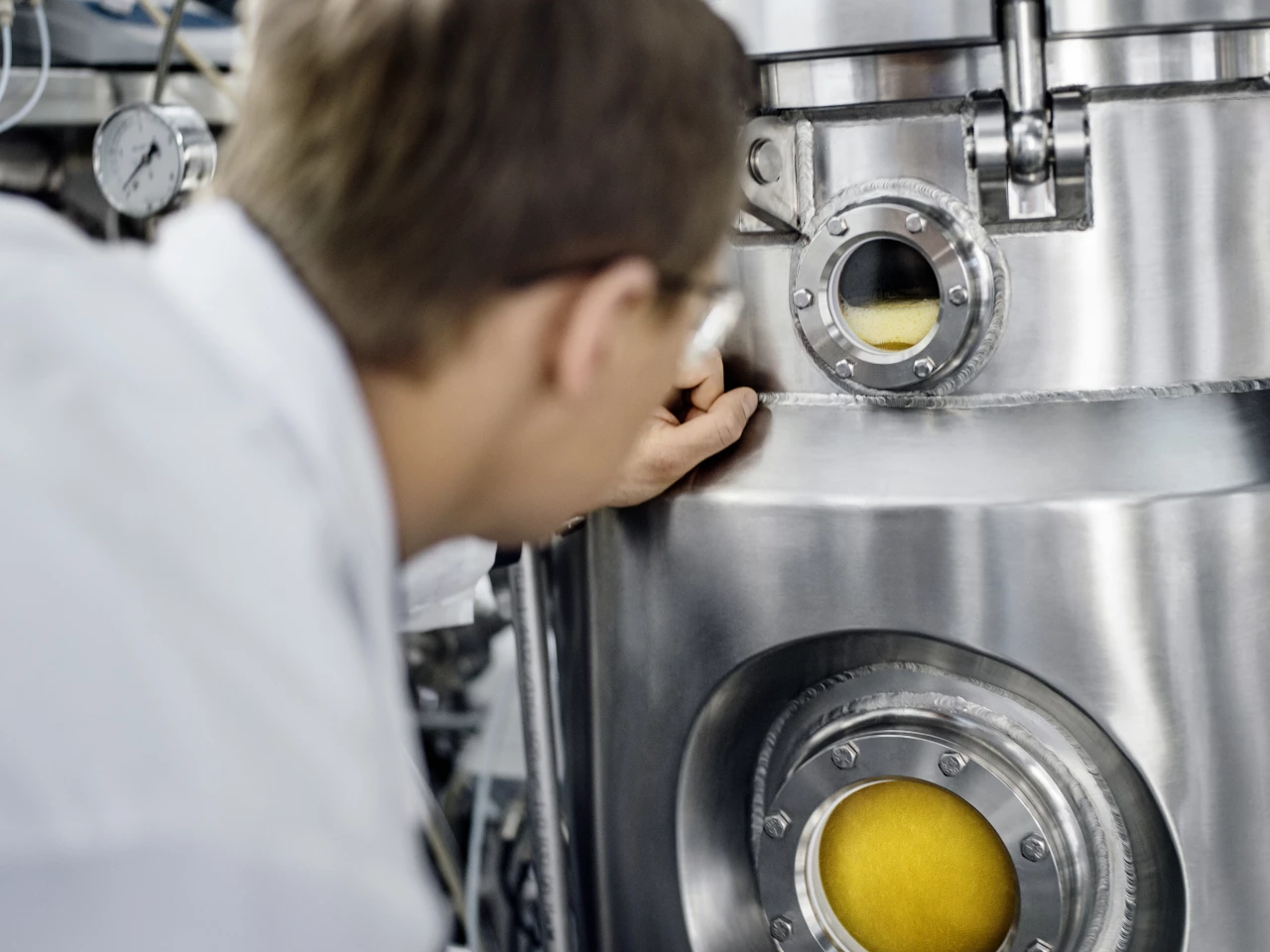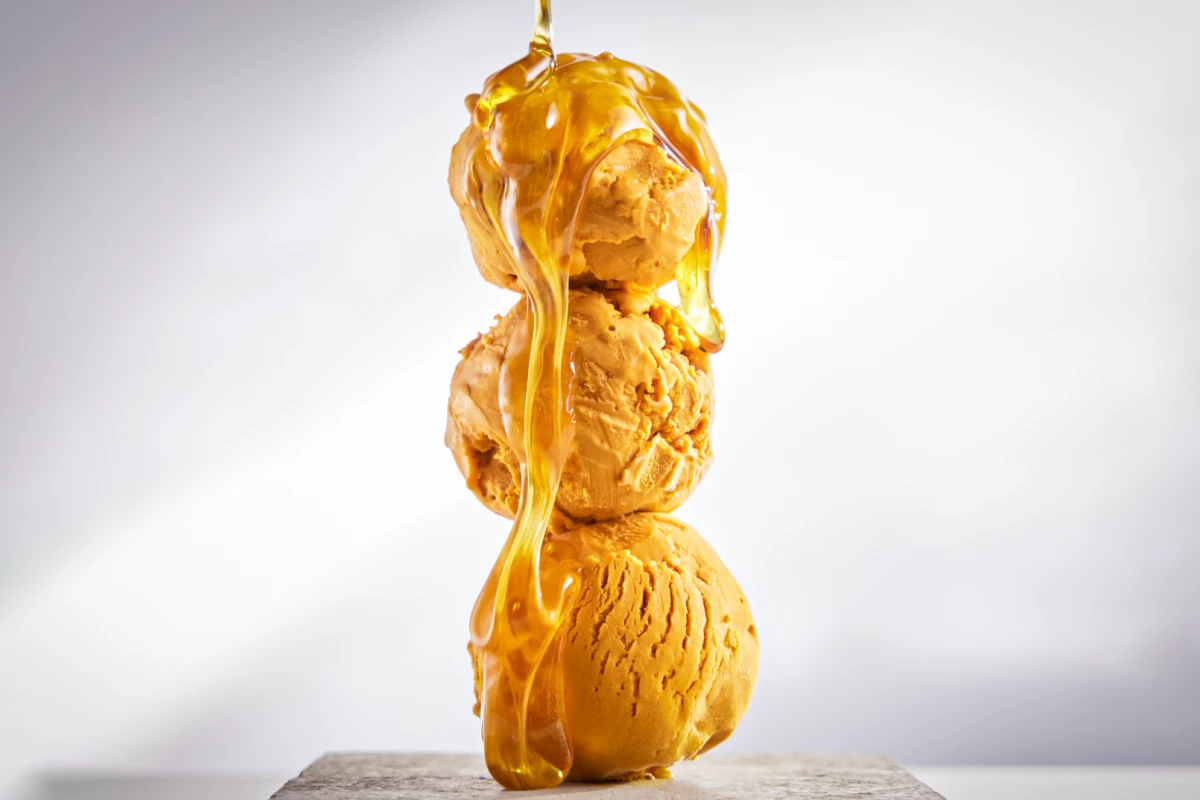The world's first commercial-scale factory for making nutrient-rich and versatile protein from air and sustainable energy has opened its doors in Finland, and the startup behind it aims to have its microbe-made food out in the US later this year. Solar Foods is just one of a handful vying for pole position in a burgeoning 'air-fermentation-based protein' market that's expected to be worth US$100 million by 2032.
The protein, called Solein (no, not soylent green; solar-protein), is the brainchild of Pasi Vainikka and bioprocesses scientist Juha-Pekka Pitkänen, who started Solar Foods on the back of this creation. Pitkänen knew of single-cell soil-dwelling microbes that oxidize hydrogen for energy, and he was certain they could be harvested and harnessed to produce cellular food.
While the pair remains secretive of the exact microbial species and origin – not surprising, there's a whole lot of money to be made in this burgeoning industry of alternative food production – they have revealed they're found close to the shore in the Baltic Sea.
The result, following fermentation and drying, is a yellowish powder that's reported to have a "mild aroma" and "notes of umami that hint at nuttiness and creaminess." Because of this, it has broad potential as a high-protein dairy replacement.
While microbes fed on carbon dioxide, hydrogen and oxygen to produce edible protein may raise more than a few eyebrows among skeptical consumers, the world is quickly heading towards a global food production reckoning. And Solar Foods is just one of the companies that see the writing on the wall and the potential fortune to be made in revolutionizing how we produce our food.
“Just like with quantum computers, it’s no longer a question of will cellular agriculture become a thing: It’s evident that it will," said Vainikka. "The question is more about who leads the charge. We are exploring the possibilities of this scientific platform on a new scale. Factory 01 demonstrates it is possible to grow protein from start to finish under one roof, year-round even in the harsh Northern conditions of Finland – and to do it all sustainably and in a commercially viable manner.”

For many of us, the rising cost of groceries or price of eggs may be our main gripes with access to food – but we're the lucky ones. Around the world, it's estimated nearly 800 million people experience prolonged hunger in 2022, up from 122 million in 2019.
Meanwhile, animal-based agriculture accounts for around 30% of greenhouse gas emissions and 70% of the planet's entire water use, as well as causing land degradation, waterway pollution and intensive forest clearing. Then throw into the mix zoonotic diseases – like the emerging H5N1 avian influenza threat – and it's difficult to see how modern methods of food production will ever be sustainable again.
Especially given that we're currently adding around 73 million new humans to the planet each year.
Which begs the question: Where the hell are we going to get enough food for everyone without further wreaking havoc on the planet – are we expected to just pull food out of thin air? Actually, yes.
Solar Foods is but one of the new batch of innovative food biotech startups vying to stake – or, ahem, steak – a claim in this revolutionary and forward-thinking new market. This way of growing food out of air was actually first employed in the 1970s by NASA, making edible nutrition grown from astronauts' oxygen supplies, but it was all but forgotten about until around 15 years ago. (This is hardly a surprise: The 'alternative food' market in the 1970s was just a limited range of fake meats, and the words "climate change" only first appeared in print in 1975.)
Fast-forward half a century and the race is on to scale up and commercialize. Competing with Solar Foods, which made its debut in Singapore last year with a chef-designed five-course meal that showcased Solein's versatility, is California's Air Protein, which also uses an undisclosed "culture" in its fermentation process. Co-founded by Lisa Dyson and John Reed, the company has raised more than $107 million to date, with investment from major players Barclays and food production giant ADM.
The company has also established a point of difference, aiming to use its protein product to specifically develop alternative meats including chicken, scallops and fish.

“Air Protein is rich in vitamins, minerals, and nutrients, with all 20 amino acids, including the nine essential amino acids and 2x the amino acids of soybeans," the company has stated. "It contains more protein per [kilogram] and is free from GMOs, pesticides, herbicides, hormones, and antibiotics."
It also uses 524,000 times less land and 112,000 times less water per kilogram than current meat production methods. And it's quick to make. Air Protein and ADM inked a deal in 2023 to establish a commercial-scale production plant.
Solar Foods' factory, which the company intends to expand quickly, uses a fifth of a hectare to produce 160 tonnes of Solein powder a year, which can then be made into a variety of foods – including 'dairy' products, meat substitutes and protein-boosted staples. Much like many other forms of fermentation, this microbial foundation is free of any animal (and, well, plant) products.

If the issue with cell-grown laboratory meat has been as much about scalability challenges as public perception, there seems to be far less of a challenge in microbial-protein foods. As well as being grown 'naturally', Solein – 65-70% protein, 5-8% fat, 10-15% dietary fibers and 3-5% mineral nutrients – uses 100 times less water and 20 times less land than plant protein production, with one-fifth of the carbon emissions.
"It can be used to replace existing proteins in a variety of foods, for example in alternative dairy and meat, different snacks and beverages, noodles and pasta, or breads and spreads," Solar Foods has said. "It is the first ever novel food disconnected from the limits of traditional agriculture. This type of production method has the potential to transform the sustainability, availability, and transparency of what we eat and where food can be produced."
And it can be made quickly, almost anywhere.
"It originates from a natural, unmodified, single-cell organism," the company said. "It is nonetheless a completely natural protein, even though it isn’t grown traditionally."
In the Netherlands, Deep Branch has developed a single-cell protein, achieved through a process of gas fermentation, known as Proton, specifically for the animal feed market. Its high-protein feed is 60% less carbon-intensive than existing proteins used in commercial agriculture. Right now, 37% of cropland is devoted solely to feeding the animals we eat – and this percentage is rising. A growing demand for seafood, coupled with climate change forces and a drop in available catches to produce aquafeed (around 97% of fish meal is used in animal feed, with nearly two-thirds of this used to sustain commercial fish farms), has pushed the price up of this high-protein stock. Proton has comparable nutrition, but a fraction of the surprising carbon footprint. While one of the lesser greenhouse gas contributors in animal-based agriculture, fish meal production accounts for 57% of aquaculture's environmentally damaging emissions.
"A single silver bullet solution will unlikely replace the traditional method of producing animal feed," the company has noted. "However, gas fermentation looks well-equipped to become one of the major players in this new space of alternative approaches. Fermentation concepts have been successfully developed for centuries, from beers to wines and everything in between, so there is reliable evidence that these technologies scale well."
Also in the Netherlands, Farmless has more recently entered the air-food race, focusing on microbes and renewable (in this case, wind) energy to develop commercial products for both humans and non-human animals.

"Since our feedstock is liquid and has an existing supply chain, it can be produced, shipped and stored anywhere in the world," Farmless has stated.
And back in California, Calysta has been quietly building its aquaculture FeedKind business using air fermentation since 2012. And, in 2022, the company joined animal nutrition giant Adisseo to build its first protein production plant in Saudi Arabia, under the collaborative name Calysseo. The goal is to have a 100,000-tonne-capacity fermenter operational by late 2026, to scale up plant- and animal-free feed production. This comes after its initial 20,000-tonne fermenter in China, dedicated to producing FeedKind for aquaculture markets.
Of course, this is just a snapshot of the startups all ramping up scale and investment. However, with Solar Foods' maiden factory now open, and Air Protein likely to follow suit. And, given the speedy production process – "grows in hours," according to Air Protein – going from 'ferm to table' will take a fraction of the time that plant and animal agriculture requires.

“Livestock needs two years to go from 'suckling to sirloin,'" Air Protein said in a statement. "Air meat can be produced in a matter of hours, through a fermentation process similar to making beer or yogurt.”
As to whether the world is ready to make friends with microbes and replace traditional protein, this remains to be seen. But we wouldn't say no to a freezer stocked full of Solein chocolate gelato courtesy of a June 2023 collaboration with Singapore restaurant Pico.
"Replacing dairy with Solein in this chocolate gelato, we were able to craft a vegan ice cream without compromising on its creaminess,” said Chef Mirko Febbrile at the time. More examples below.
Source: Solein










